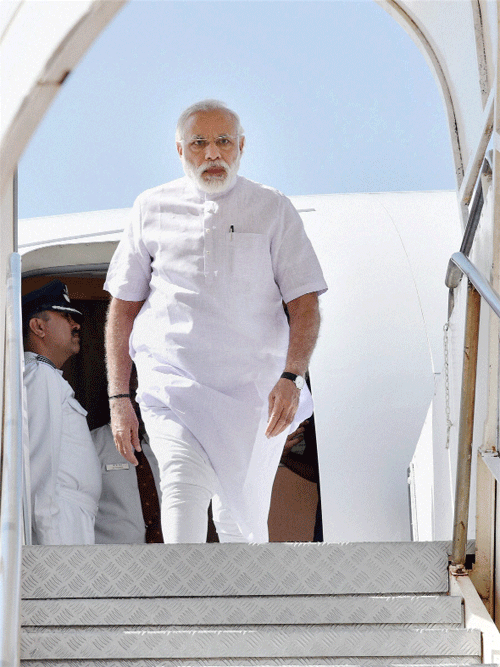In his fourth visit to the Gulf starting today, the PM is expected to put in place an investment treaty to boost the country’s economy, and ink pact on sharing intelligence on terror financing amid rising fears of the ISIS
Prime Minister Narendra Modi is on a two-day visit to the tiny but energy-rich Gulf Cooperation Council State of Qatar in continuation of his efforts to further cement India’s bilateral ties with the strategically important Gulf region. In his first visit to Qatar, Modi is expected to hold extensive talks with the Amir of Qatar, Sheikh Tamim bin Hamad Al-Thani, on a range of bilateral issues, including ways to further strengthen economic ties, particularly in the hydrocarbon sector. The visit is also providing an opportunity to the leadership of two important countries in their respective regions to deliberate on regional and international issues of mutual concern.
In his fourth visit, since coming to power two years ago, to this geo-economic, geo-strategic and geo-politically crucial region, the Prime Minister is expected to put in place an investment treaty to boost the country’s economy. He is also likely to ink pact similar to what has already been entered into with the United Arab Emirates and the Kingdom of Saudi Arabia on sharing information on terror financing amid rising fears of the ISIS making inroads in India. Other deals expected to be concluded during Modi’s trip include agreements on sports, skills development, health and tourism.
India’s historical ties with Qatar are marked by extensive people-to-people contacts and have grown strong during the last four decades. The first agreement that was signed, following establishment of diplomatic relations between the two countries in 1973, was on cultural cooperation in 1980. This cooperation was further cemented in 1983 with the first ever State visit of then President of India Giani Zail Singh to Doha to promote and encourage exchange of cultural activities between the two countries. The contemporary times have opened a plethora of new avenues of cooperation that go beyond India’s erstwhile role as provider of labour force and importer of oil. There has been an avalanche of recent bilateral agreements and a massive inflow of investment capital. Sheikh Hamad bin Khalifa Al Thani the former Amir of Qatar’s visit to India in April 2012 had heralded a new era in Doha’s larger engagement with India. During that visit, a number of agreements pertaining to cooperation in the field of oil, gas, education, legal affairs, culture, banking and for organising exhibitions were signed.
The Modi Government is clearly aware that widespread partnership with the Gulf countries is critical for New Delhi to counter the menace of terror that has all the potential to not only threaten India’s national security but also the regional stability. India and Qatar have a comprehensive defence cooperation agreement that was signed in 2008 during the visit of former Prime Minister Manmohan Singh. That agreement allowed mutual Maritime Defence Training and Field Training exercises. Also the agreement pertaining to law enforcement and national security permits the two countries to exchange classified information and help each other in suppressing threats raised by extremist elements.
During the visit of the Amir of Qatar last year, New Delhi and Doha signed another six agreements on the transfer of sentenced prisoners and cooperation in information and communication technology. Other agreements were on cooperation between the Ministry of Earth Sciences and Qatar Meteorological Department for scientific and technical cooperation and between the Diplomatic Institute of the foreign ministry of Qatar and the Foreign Service Institute of India’s External Affairs Ministry, an agreement for cooperation in the field of radio and television and an agreement for mutual cooperation and exchange of news. Under the agreement on sentenced prisoners, Indian prisoners convicted in Qatar are brought to India to serve the remaining part of their sentence. Similarly, Qatari citizens convicted in India are sent to their home country to serve their sentence.
The regular high-level bilateral visits have helped the two nations to closely understand each other and become a formidable ally. With the passage of time, Qatar has emerged as an important trading partner for India in the Gulf region with bilateral trade in 2014-15 exceeding $15 billion. It is India’s largest supplier of lNG requirements, accounting for 65 per cent of the country’s total imports in 2015-16. Doha is also one of India’s key sources of crude oil and plays a vital role in helping India meet its energy needs. Also apart from a number of Indian companies such as larson & Tubro, Tata Projects, Voltas, and Punj lloyd who have actively been participating in various projects in Qatar, several other Indian companies are involved in the construction work going on in full swing to build infrastructure needed for the FIFA World Cup which is being hosted by Qatar in 2022.
like in all the other Arab Gulf countries, Indians in Qatar form the largest expatriate community and are highly appreciated by the Qatari nationals and their leaders for their sincerity, honesty and hard work. While seven lakh Indians who live and work there significantly contribute to the progress and development of this wealthy Gulf State, they also remit to India around $3 billion annually to participate in nation building by strengthening the Indian economy.
(The writer is a former diplomat, and at present Director, India Islamic Cultural Centre, New Delhi)
























